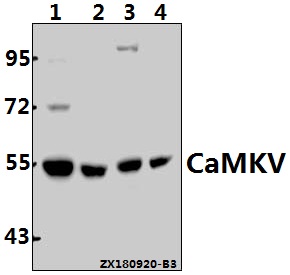Product Name :
CaMKV (N217) polyclonal antibody Background :
The Ca2+/calmodulin-dependent protein kinases (CaMKs) comprise a structurally related subfamily of serine/threonine kinases. CAMKV (CaM kinaselike vesicle-associated), also known as 1G5 or VACAMKL, is a 501 amino acid protein that localizes to cytoplasmic vesicles, as well as to the cell membrane, and contains one protein kinase domain. Although a member of the CaMK family, CaMKV is thought to be catalytically inactive, but it may play a role in vesicle function and nervous system development. Multiple isoforms of CaMKV exist due to alternative splicing events. The gene encoding CaMKV maps to human chromosome 3, which houses over 1,100 genes, including a chemokine receptor (CKR) gene cluster and a variety of human cancer-related gene loci. Key tumor suppressing genes on chromosome 3 include those that encode the apoptosis mediator RASSF1, the cell migration regulator HYAL1 and the angiogenesis suppressor SEMA3B. Marfan Syndrome, porphyria, von Hippel-Lindau syndrome, osteogenesis imperfecta and CharcotMarie-Tooth disease are a few of the numerous genetic diseases associated with chromosome 3. Product :
Rabbit IgG, 1mg/ml in PBS with 0.02% sodium azide, 50% glycerol, pH7.2 Storage&Stability :
Store at 4°C short term. Aliquot and store at -20°C long term. Avoid freeze-thaw cycles. Specificity :
CaMKV (N217) polyclonal antibody detects endogenous levels of CaMKV protein. Immunogen :
Synthetic peptide, corresponding to amino acids 186-247 of Human CaMKV. Conjugate :
Unconjugated Modification :
Unmodification
CaMKV (N217) polyclonal antibody Background :
The Ca2+/calmodulin-dependent protein kinases (CaMKs) comprise a structurally related subfamily of serine/threonine kinases. CAMKV (CaM kinaselike vesicle-associated), also known as 1G5 or VACAMKL, is a 501 amino acid protein that localizes to cytoplasmic vesicles, as well as to the cell membrane, and contains one protein kinase domain. Although a member of the CaMK family, CaMKV is thought to be catalytically inactive, but it may play a role in vesicle function and nervous system development. Multiple isoforms of CaMKV exist due to alternative splicing events. The gene encoding CaMKV maps to human chromosome 3, which houses over 1,100 genes, including a chemokine receptor (CKR) gene cluster and a variety of human cancer-related gene loci. Key tumor suppressing genes on chromosome 3 include those that encode the apoptosis mediator RASSF1, the cell migration regulator HYAL1 and the angiogenesis suppressor SEMA3B. Marfan Syndrome, porphyria, von Hippel-Lindau syndrome, osteogenesis imperfecta and CharcotMarie-Tooth disease are a few of the numerous genetic diseases associated with chromosome 3. Product :
Rabbit IgG, 1mg/ml in PBS with 0.02% sodium azide, 50% glycerol, pH7.2 Storage&Stability :
Store at 4°C short term. Aliquot and store at -20°C long term. Avoid freeze-thaw cycles. Specificity :
CaMKV (N217) polyclonal antibody detects endogenous levels of CaMKV protein. Immunogen :
Synthetic peptide, corresponding to amino acids 186-247 of Human CaMKV. Conjugate :
Unconjugated Modification :
Unmodification
-
 Western blot (WB) analysis of CaMKV (N217) polyclonal antibody at 1:1000 dilution Lane1:HEK293T whole cell lysate(40ug) Lane2:U-87MG whole cell lysate(40ug) Lane3:PC12 whole cell lysate(40ug) Lane4:BV2 whole cell lysate(40ug)
Western blot (WB) analysis of CaMKV (N217) polyclonal antibody at 1:1000 dilution Lane1:HEK293T whole cell lysate(40ug) Lane2:U-87MG whole cell lysate(40ug) Lane3:PC12 whole cell lysate(40ug) Lane4:BV2 whole cell lysate(40ug)
Bioworld Biotech only provide peptides for our antibodies and do not provide additional peptide customization services.
Price/Size :
USD 368/1mg/vial
Tips:
For phospho antibody, we provide phospho peptide(0.5mg) and non-phospho peptide(0.5mg).Describe :
Blocking peptides are peptides that bind specifically to the target antibody and block antibody binding. These peptide usually contains the epitope recognized by the antibody. Antibodies bound to the blocking peptide no longer bind to the epitope on the target protein. This mechanism is useful when non-specific binding is an issue, for example, in Western blotting (WB) and Immunohistochemistry (IHC). By comparing the staining from the blocked antibody versus the antibody alone, one can see which staining is specific; Specific binding will be absent from the western blot or IHC performed with the neutralized antibody.Formula:
Synthetic peptide was lyophilized with 100% acetonitrile and is supplied as a powder. Reconstitute with 0.1 ml DI water for a final concentration of 10 mg/ml.The purity is >90%,tested by HPLC and MS.
Storage:
The freeze-dried powder is more stable. For short time at 2-8°C. For long term storage store at -20°C.
Note :
This product is for research use only (RUO only). Not for use in diagnostic or therapeutic procedures.
 CaMKV (N217) polyclonal antibody
CaMKV (N217) polyclonal antibody  Datasheet
Datasheet COA
COA MSDS
MSDS SHIP
SHIP